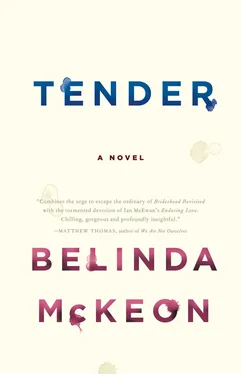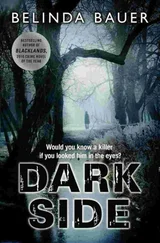She had Birthday Letters on the desk in front of her. James had given it to her that day after the incident in the bookshop; he had signed it:
Catherine,
With love always
(even though it’s not even your birthday)
James.
On the jacket flap, Ted Hughes looked unkempt, his hair in wild flyaway strands. But dignified, still: a dark tie, a V-neck under a herringbone jacket. His eyes just darkness. His mouth in a half smile.
She knew what she wanted her essay to be about now: she wanted to write about his presence in Plath’s poetry, and her presence in these new ones of his. About autobiography, and how it never showed itself in the work in the lazy way that readers expected it to. She stared at the book’s cover, its abstract reds and yellows and blues. She opened a page at random; “Wuthering Heights.” She pulled it to her. Planted an elbow on each page and pushed her fingers into her hair.
Writers
Were pathetic people. Hiding from it
And making it up.
Their trip to the Brontë ruins. The imagined ghost of Emily, and what she would have made of Sylvia’s giddy presence in the house, her huge hope. Her “huge / Mortgage of hope.”
Catherine was there with them. The wet, rotting beams, the stone floors covered with sheep droppings. In her mind’s eye, it was her father’s shed, the shed where he fixed farm machinery now, the shed that had been a home to someone not long ago. The moors she had never seen; but she could imagine them. Could imagine their whirling eddies of harshness and indifference. The winter sky, stern over a couple driven to be tourists in this place which, to them, ought to have been only too familiar — and must have been to one of them, at least, to Ted — and she could see it, Catherine could, the near blackness, the low ceiling, the shadowed corners, the sky leaning low. The stones, and the grass, and the animals looking in.
“Reilly. Where were you this morning?”
Emmet. He was crouching by her desk, holding onto the side, and he was grinning. He was reminding her that there had been a TN meeting that morning; Catherine had not bothered to go.
“Forgot about it,” Catherine said, and shrugged. “Did I need to be there?”
He clicked his tongue. “No loyalty.”
“No energy,” she said. “I’m knackered after the weekend.”
“And what were you doing at the weekend?”
“Probably the same thing you were doing,” she said.
“Well, I was trying to convince Derek Galvin to go skinny dipping in the canal. So I hope you weren’t doing that.”
“Skinny dipping with you? ”
“No!” he said, looking horrified. “By himself. Why would I want to go skinny dipping with Galvin? Jesus Christ.”
“OK.”
“What are you reading?” Emmet said now. He tipped at the book like a cat with a toy. “Sorry,” he said then, quickly, with a wobbly smile.
“Ted Hughes,” Catherine said, unnecessarily, because in the same moment Emmet had reached over, closed the book and pulled it to him; he was examining the cover.
“Oh, yeah, I read something about this lately. Your one was his missus, wasn’t she? Who topped herself?”
“Sylvia Plath.”
“Yeah,” he nodded. “See, I know about poetry.” He opened to the description on the inside jacket flap. “Oh. These are about her, are they?” he said, after he’d read for a few seconds.
“Yeah,” Catherine said. “He wrote them for her.”
“For her birthday?”
“Kind of. Every year, like. She’s been dead for thirty-five years now.”
He nodded. “It’s sad, isn’t it? The way she died.”
There was this aspect to him, Catherine had noticed lately: this bluntness and frankness that startled her. These questions or statements he came out with, as unvarnished as a child’s.
“Yeah,” she said. “It was sad.”
He had settled on a page and had begun to read the poem. “9 Willow Street,” she saw.
“It’s about when they went to Boston,” Catherine said. “He was teaching at Harvard.”
“Jesus,” Emmet said, after he had been reading for a few moments. “They sound like a right barrel of laughs, the two of them.” He assumed a deep, plummy voice. “‘I folded / Black wings round you, wings of the blackness / That enclosed me, rocking me, infantile / And enclosed you with me.’ Jesus.” He shuddered.
“He doesn’t sound like that,” Catherine said. “He didn’t go to Gonzaga.”
“Signs are on him,” Emmet said, and he kept going. “‘And your heart / Jumped at your ribs, you gasped for air. / You grabbed for the world, / For straws, for morning coffee, anything / To get airborne.’” He looked at her. “Could he not just make her a fucking coffee?”
“Give me that,” Catherine said, and she snatched the book from him.
“Are they all that melodramatic?”
“Are you going to stay here and torment me all morning?”
“I might,” he said, grinning in response, but he looked distracted. He was looking at her but he was not, she knew, concentrating on what she was saying as she told him now that she was on a deadline with this essay. He nodded, but he was doing the thing she had known other guys to do — it had taken her a while to work it out, but she knew what it was now — which was the thing of letting her talk, encouraging her to talk, even, so that they could use it as an excuse to look at her more closely. He was studying her face now, she knew, instead of listening to her. And he was grinning. And he was cute when he grinned like that, there was no denying it. And he was cute, there was no denying it, when he didn’t grin.
But he wasn’t James. Nobody was James.
“James,” he was saying now, and Catherine stared at him.
“What?”
“Did you see James this weekend?”
And that was another first: blushing at the mention of James’s name; and she blushed harder as she talked about the dinner he had thrown, and she saw Emmet noticing this, and thinking about it, puzzling over it; tracking the blush across her face as it spread.
“And, em,” he said, picking up the book again, “what’s your favorite poem in this?”
“‘Robbing Myself,’” Catherine said immediately. She opened the index and found the page, pushing it towards him. “It’s about Hughes driving to their house in Devon after they’d left it. They’d split up by then, and he was going back to check on his potatoes and apples.”
“His potatoes? ” Emmet said, incredulously. “What a fucking culchie.”
From across the library, someone shushed them.
“You’re incorrigible,” Catherine said. “I’m not going to let you read it if you’re going to slag it off.”
“No, no,” Emmet said, pulling the book to him. “I’m sorry.”
“It would have been a couple of months before Plath died,” Catherine said. “He says December. The December dusk.”
“‘Over fallen heaven,’” Emmet said. “For snow. That’s good.”
“Yeah,” Catherine nodded. “That’s good.”
He read on. “He likes his potatoes all right,” he said, raising his eyebrows.
“No talking,” Catherine said. She watched him read.
“‘Pigs’ noses,’” Emmet said with a smirk, and she rapped on the table beside him.
“Sorry,” he said, and he kept reading. And she watched him, as he came to the passage where Hughes crept through the house, the silent house, listening to the absence of his family, of his wife and children, feeling like a trespasser, seeing their books, the walnut desk, the Victorian chair he had bought for five shillings— Love, love, I have hung our cave with roses —
Читать дальше












